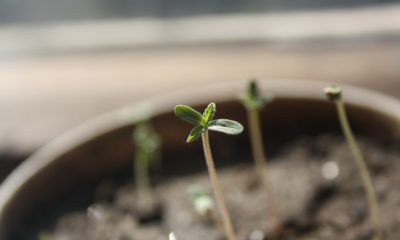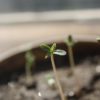
Cultivation
Face of the Farmer: Prime Kind Farms
With livestock, hemp and cannabis, this multi-generational Oregon farm exemplifies diversification at its best.
When Ben Bickle was growing up on his parent’s farm in Grants Pass, OR, he learned to grow food, cut flowers, raise livestock and fell timber. Nearly everything they consumed came from the farm, the forest, the river or the sea. Owning a cannabis farm was nowhere near his thoughts.
“I thought everyone lived like that,” he says. “I was 17 when I realized that wasn’t the norm, and that people bought meat and produce at the store. The travesty is, most people don’t realize where food comes from, how it’s farmed, or how livestock is treated. They don’t think about what they put into their bodies and how it got there.”
Bickle’s father worked as an agricultural advisor for the State of Oregon for 36 years, also teaching agriculture at the local high school, where he and his wife met. His mom was an art teacher, retiring a dozen years ago. His dad retired from both ag work and teaching in 2002.
Ask any farmer what its biggest export is and they might tell you it’s their children who leave the farm to find themselves in the world. That’s precisely Ben Bickle’s story.
“I left the family farm for Alaska when I was 19 years old,” he begins. “I loved snowboarding and competed—traveling on the road for outerwear companies. I’d go to places in the winter where there was snow, then head to the rivers in the summer for fly fishing. It’s all still here in Oregon, but I got the traveling part out of my system.”
After being gone for a decade, Bickle said he came back to the roost, following in his parents’ footsteps, studying—then teaching—fine art at the same school his mom and dad taught at, while continuing to work the farm. And, more importantly, to raise his own children in the sustainable lifestyle he’s come to love.
The only difference today, he says, is he added hemp, then cannabis to the mix, when it was legal to do so.
“The hemp and cannabis [additions to the farm] are all me,” he says. “Mom and Dad have come to understand it all; and though Dad’s retired from farming, he comes over and helps often.”

Plants Over Pharma
As a young child, Bickle said he was diagnosed with Attention Deficit Disorder (ADD), and was prescribed the pharmaceutical, Ritalin.
According to the Center for Disease Control, “ADD is one of the most common neurodevelopmental disorders of childhood.” Often lasting into adulthood, people diagnosed have a hard time focusing, paying attention and controlling impulsive behaviors—often diagnosed alongside Obsessive-Compulsive Disorder.
As cited in a PubMed report, Cannabis for the Treatment of Attention Deficit Hyperactivity Disorder: A Report of 3 Cases, the subjects questioned were already using cannabis for the condition, with all reporting, “subjective improvements in symptoms and on quality of life.” It was assumed and surmised by the doctors conducting the report, “that cannabis played a complementary role in the therapeutic regimen of the three patients.”
Bickle credits his parents with being smart enough to prevent him from taking Ritalin, instinctively knowing that redirecting their rambunctious son to sports and farm work would help him focus.
They weren’t wrong.
“My day began at five in the morning,” he says. “I’d feed and care for the animals, tended to the food we grew, whatever had to be done before school. I learned a serious work ethic on the farm, and combined with sports, it kept me busy and out of too much trouble.”
He realized cannabis helped him focus just by smoking when he was a teenager but kept it under wraps on the farm and within his conservative farming community for many years. Today, he has a better understanding of how hemp and cannabis—medicinal plants—helped him over the years.
Food, Swine & Weed
Oregon was the first state in the country to decriminalize possession of small amounts of cannabis in 1973, with a ticket given likened to a traffic offense making the offense tolerated for decades. In 1998, Oregonians voted to add medicinal use of the plant; then finally legalizing it for adult use after several failed attempts on the ballot, in 2014.
Prime Kind Farms was founded by his parents in 1972, with Bickle running its medical cannabis and hemp operation since 2008, in what he refers to as a polyphase farm, meaning having or producing two or more phases of a certain thing. For Bickle, his use of two terms together with “sustainable polyphase” farming is having or producing two or more phases of agricultural products being grown or raised in a rotation with the land, on what it can yield efficiently and effectively given the season or year.
Many farms, he says, are monocultured, with Prime Kind Farms able to be highly diversified and non-stagnant as they can be.
“We run two acres of hemp, while rotating our land use, sourcing all our own livestock compost as our only feed for the hemp, from 75 to 150 head of hogs,” he says. “We aren’t allowed to feed the livestock hemp, which is a shame, as they’d benefit from it. All our livestock graze free-range on the farm.”
According to an article in GlobeNewswire.com, prior to the prohibition of hemp in the US, all livestock grazed on, what used to be called, “ragweed,” that grew wild across the plains. With a full cannabinoid and terpene profile, the grazing feed was loaded with beneficial compounds, that were then passed down to the consumer for optimal health.
Sadly, the 2018 Farm Bill, allowing American farmers to grow hemp again, have restricted hemp byproducts to be fed to livestock. This is something that makes little sense to Bickle and is an issue hemp farmers are working to change.

Art & Ag
The apples didn’t fall to far from the family tree, as Bickle’s kids are showing an interest in art, as well as working on the hemp farm.
“Just like my mom was, I’m the only fine arts teacher at the high school, so I’ve been able to teach a wide variety of mediums,” Bickle says. “I teach eight projects per semester, including drawing, painting, digital photography and sculpting.”
Bickle says they’re definitely an art family and will probably always own the cannabis farm, but he believes the cannabis market has to change.
“Unless the market space for cannabis gets a little bit more understanding in realizing sungrown cannabis is more superior to indoor grown in a greenhouse, I’ll keep teaching art, and we’ll keep focusing on our food crops for our bread and butter,” he said.
For decades food farmers on the North Coast—stretching from Washington State to Northern California—have been subsidizing with cannabis in order to allow them to be food farmers. In the case of the Bickles, adding cannabis when it was legal to do so, has added another much-needed revenue stream, but it’s also introduced an unexpected element: ridicule.
“Cannabis use still has a negative stigma attached to it,” he says. “As educators in our community, we’ve had to walk a fine line in farming legal cannabis. It’s added a whole other layer concerning education on the benefits of the plant, while we maintain respect as longtime, established food farmers and educators in the community.”


























